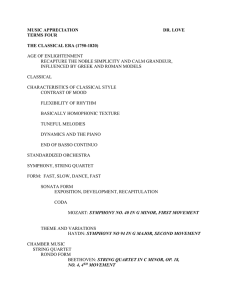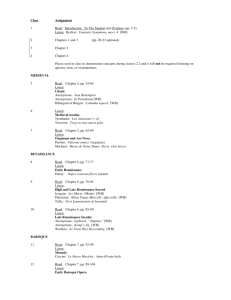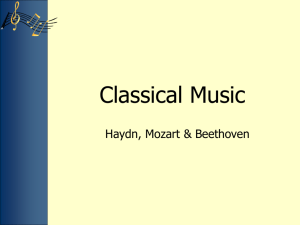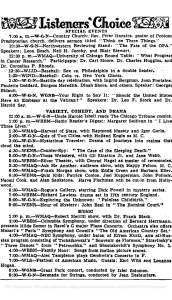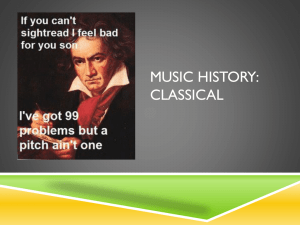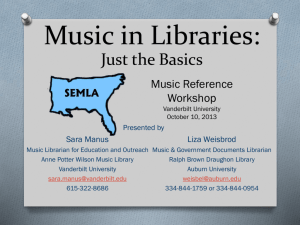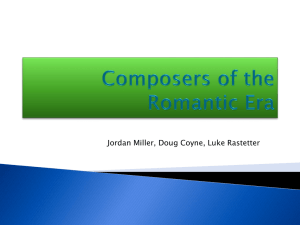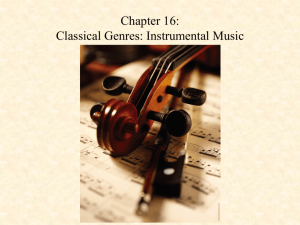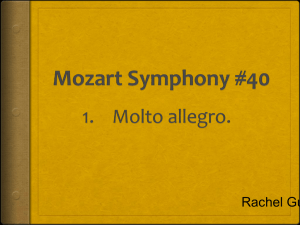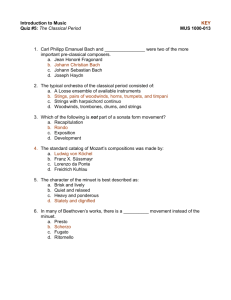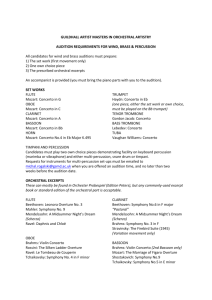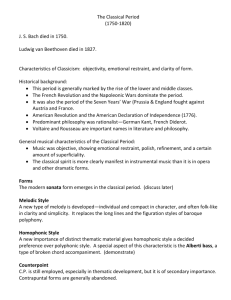Introduction to Music Outline of Topics and Listening Assignments
advertisement
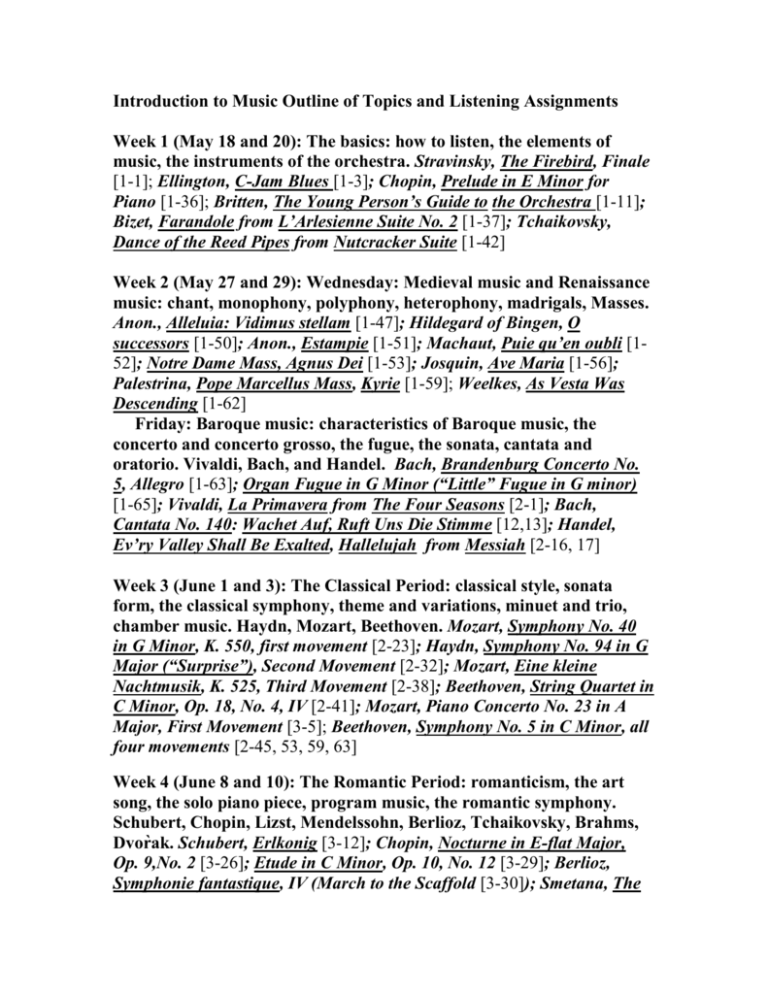
Introduction to Music Outline of Topics and Listening Assignments Week 1 (May 18 and 20): The basics: how to listen, the elements of music, the instruments of the orchestra. Stravinsky, The Firebird, Finale [1-1]; Ellington, C-Jam Blues [1-3]; Chopin, Prelude in E Minor for Piano [1-36]; Britten, The Young Person’s Guide to the Orchestra [1-11]; Bizet, Farandole from L’Arlesienne Suite No. 2 [1-37]; Tchaikovsky, Dance of the Reed Pipes from Nutcracker Suite [1-42] Week 2 (May 27 and 29): Wednesday: Medieval music and Renaissance music: chant, monophony, polyphony, heterophony, madrigals, Masses. Anon., Alleluia: Vidimus stellam [1-47]; Hildegard of Bingen, O successors [1-50]; Anon., Estampie [1-51]; Machaut, Puie qu’en oubli [152]; Notre Dame Mass, Agnus Dei [1-53]; Josquin, Ave Maria [1-56]; Palestrina, Pope Marcellus Mass, Kyrie [1-59]; Weelkes, As Vesta Was Descending [1-62] Friday: Baroque music: characteristics of Baroque music, the concerto and concerto grosso, the fugue, the sonata, cantata and oratorio. Vivaldi, Bach, and Handel. Bach, Brandenburg Concerto No. 5, Allegro [1-63]; Organ Fugue in G Minor (“Little” Fugue in G minor) [1-65]; Vivaldi, La Primavera from The Four Seasons [2-1]; Bach, Cantata No. 140: Wachet Auf, Ruft Uns Die Stimme [12,13]; Handel, Ev’ry Valley Shall Be Exalted, Hallelujah from Messiah [2-16, 17] Week 3 (June 1 and 3): The Classical Period: classical style, sonata form, the classical symphony, theme and variations, minuet and trio, chamber music. Haydn, Mozart, Beethoven. Mozart, Symphony No. 40 in G Minor, K. 550, first movement [2-23]; Haydn, Symphony No. 94 in G Major (“Surprise”), Second Movement [2-32]; Mozart, Eine kleine Nachtmusik, K. 525, Third Movement [2-38]; Beethoven, String Quartet in C Minor, Op. 18, No. 4, IV [2-41]; Mozart, Piano Concerto No. 23 in A Major, First Movement [3-5]; Beethoven, Symphony No. 5 in C Minor, all four movements [2-45, 53, 59, 63] Week 4 (June 8 and 10): The Romantic Period: romanticism, the art song, the solo piano piece, program music, the romantic symphony. Schubert, Chopin, Lizst, Mendelssohn, Berlioz, Tchaikovsky, Brahms, Dvorà k. Schubert, Erlkonig [3-12]; Chopin, Nocturne in E-flat Major, Op. 9,No. 2 [3-26]; Etude in C Minor, Op. 10, No. 12 [3-29]; Berlioz, Symphonie fantastique, IV (March to the Scaffold [3-30]); Smetana, The Moldau [3-34]; Dvorak, Symphony No. 9 in E Minor, Op. 95 (from the New World), I [3-41]; Brahms, Symphony No. 3 in F Major, Op. 90, III [3-48]. Week 5 (June 15 and 17): Opera: Baroque opera, Mozart, Puccini, Verdi, Wagner, Bizet. Monteverdi, Orfeo, “Tu se’ morta” [1-71]; Mozart, Don Giovanni, K. 527, Act I, Introduction [3-1]; Puccini, La Boheme, Act I, excerpt [3-51]; Wagner, Die Walkure, Act I (love scene, conclusion [41]); Verdi, selection from La Traviata (in class only); Bizet, selection from Carmen (in class only). Week 6 ( Monday, June 22): The 20th Century: Impressionism, atonality, serialism, minimalism, aleatoric music, Debussy, Stravinsky, Schoenberg, Bartok, Ives, Gershwin, Copland, Bernstein, Adams, Cage. Debussy, Prelude a L’Apres-midi d’un faune [4-9]; Stravinsky, Le Sacre du printemps, Part I: Introduction, Omens of Spring—Dances of the Youths and Maidens, Ritual of Abduction [4-16]; Schoenberg, Pierrot lunaire, Op. 21, “Mondestrucken” [4-24]; Bartok, Concerto for Orchestra, II [4-29]; Ives, Selection from Three Places in New England (in class only), Gershwin, selection from Rhapsody in Blue (in class only); Copland, Appalachian Spring, section 2, Theme and variations on “ Simple Gifts” [4-41]; Bernstein, West Side Story, “Tonight” ensemble [464]; Adams, Short Ride in a Fast Machine [4-53]; Cage, Sonatas and Interludes for prepared piano [4-47]. (Wednesday, June 24): Final exam.
